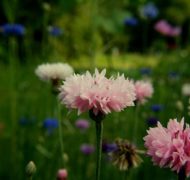Ten Acre Dream
Blog / Produced by The High Calling
“We want to live off the grid,” she tells me.
I hadn’t known she was married, that she had eloped three years ago. She and her husband live in a small apartment and have access to a garden. They grow potatoes, chard, and zucchini by the bushels. They are researching, planning, figuring. I watch her talk about their hope like it is already reality, but the conversation feels like a dream.
My grandmother could have done it, lived off the grid. She farmed ten acres of suburban land single-handedly. The zinnias alone, not necessarily a requirement for off-the-grid living, would have impressed you with their bright abundance. They were wheels and wheels of yellow, pink, magenta, red, orange . . . colors like a dream (the kind in which you promise someone you’ll skip rope eternally in exchange for lollipops and orange soda, until you’re too old to remember you don’t like lollipops anymore).
Unlike the demands of the dream, my grandmother required nothing in exchange for the privilege of admiring her zinnias. I touched their petals, stared at the way they overlapped like huge velvety fish scales.
The zinnias were one thing; the berries, fruit trees, and vegetables were another. Once, I ate so many mulberries I stained myself and my dress purple. My mother was angry, as the story has it, but for me it was a child’s dream. Berries upon berries upon berries, until I could eat (and stain) no more.
The whole ten acres was rather like that. If the world markets had crashed and the supermarket shelves gone empty, I could have survived off the grid at my grandmother’s house. Strawberries, blueberries, cherries, plums (both yellow and purple), lettuces, string beans, cucumbers, and an acre of corn. (Once, she even offered me turtle soup, because she’d caught and cooked a snapper from the L-shaped lake that lay on the west side of her property. I didn’t eat it.) What we couldn’t finish eating fresh, for the sheer abundance of it, we could find later, lining the shelves on the way down the slate and concrete basement stairs. I have never since tasted three-quarter-inch fat sweet pickles that were anything like her signature canned (glassed?) goods.
“Where could you live off the grid?” I ask my married-three-years-now friend. Somewhere in South America, she tells me. Farming.
I laugh.
Not at her, but at the thought of me trying to do the same — live off the grid. Granted, last winter I single-handedly fed an unplanned lunch to a group of twenty snow-stranded parishioners. I found two sugar pumpkins left over from a harvest festival sponsored by the church. I peeled and chopped them (a real pioneer woman’s job), borrowed an onion from the lady next door, found some canned corn and salt and pepper and nutmeg in the cabinet (who knew these things existed above the sink before that day?), and put everything together in a surprising soup. People seemed impressed that I’d made something out of nothing, just when they thought they’d have to go hungry while waiting for the storm to abate.
The truth is every year I plant cucumbers, tomatoes, zucchini, and other promising vegetables. I dig, prune, water, wait. Nothing much happens. I must be the only woman alive to reap a single zucchini from six plants. I put this year’s bumper crop in a sauce, since it was too small to stand on its own. In fact, my daughter asked me what it was, being that its size didn’t betray its vegetable identity.
Right now I should be planting winter rye and red clover — cover crops, to build the soil for next year’s vegetable dreams. But I know it doesn’t really matter. Come next fall, I will be looking at my gardens that pretended all summer, until they wilted into fall.
If I could find the farmerly-grandmother gene I seem to have misplaced, I might be able to move to South America and live off the grid with my friend and her husband. I could impress people with pumpkin soup made from the flesh of my own sugar pumpkins. I could harvest onions and corn. We’d have strawberries for breakfast, or plums. I could quote Willliam Carlos Williams and pretend to apologize for eating the plums someone had set aside for himself in the fridge (though perhaps there would be no fridge if we lived off the grid).
You should not be alarmed at my wishes for another reality, or the thought that you might knock on my door and find I’ve eloped with my zucchini plants to South America. Unlike my grandmother, I couldn’t feed a single person for a day with my agricultural skills. Unless dreams themselves could feed.
This post is offered in celebration of our bookclub selection, The Spirit of Food. It first appeared at The Curator, and is by L.L. Barkat, author of God in the Yard: Spiritual Practice for the Rest of Us.
*Most of the material on The High Calling is available for reuse. Unfortunately, work by Laura Barkat is not available for reuse. If you are interested in reprinting work by Laura Barkat, please contact her directly.”





